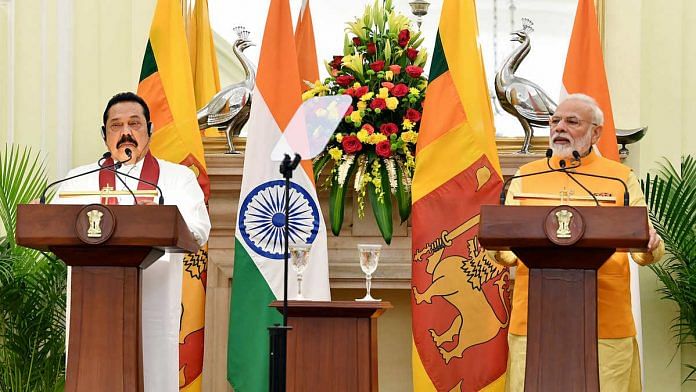
New Delhi: India is likely to abstain from voting at the United Nations Human Rights Council (UNHRC) in Geneva Tuesday, which will take up a resolution against Sri Lanka for war crimes against Tamils, ThePrint has learnt.
This comes at a time when, on the one hand, New Delhi is pushing the Sri Lankan government to handover the East Container Terminal project, which was scrapped in February, while on the other, it is facing domestic pressure from election-bound Tamil Nadu to favour the UNHRC resolution.
According to sources, India believes voting against Sri Lanka will not be conducive to the growth of bilateral ties as New Delhi considers the island nation as a “friendly” neighbouring country.
India, thus, does not want to be seen as taking any action that could prove to be detrimental to bilateral ties as the possibility of Sri Lanka further tilting towards China looms large.
However, sources added, New Delhi will also continue to push the Rajapaksa government to implement the 13th Amendment of the Sri Lankan Constitution, which is aimed at giving equal rights to the minority Tamils there.
The draft resolution, which has been under consideration in the present session of the UNHCR, is based on a report submitted by the Office of the High Commissioner for Human rights on 27 January.
The report stated Sri Lanka is “on alarming path towards recurrence of grave human rights violations” and that “failure to deal with the past continues to have devastating effects on tens of thousands of family members from all communities who persist in seeking justice, reparations and the truth about the fate of their loved ones”.
The resolution that was tabled by the Core Group on Sri Lanka at the UNHCR — which includes the UK, Germany and Canada — comprises proposals of imposing sanctions on Colombo and certain strict action points for the Sri Lankan government to follow, sources said.
India voted against Sri Lanka in 2012
On 13 March, Sri Lankan President Gotabaya Rajapaksa had called up Prime Minister Narendra Modi during which Modi “reiterated the importance of Sri Lanka to India’s Neighbourhood First policy”.
The UNHRC has been bringing up resolutions on Sri Lanka for almost a decade now. Last time, on 27 March 2014, India abstained from voting in favour of a similar resolution, which received support from 23 countries out of 47 UNHRC members. India had voted in favour of a similar resolution in 2012.
At the ongoing session of the UNHRC, Indra Mani Pandey, India’s Permanent Representative to the UN, had said last month India remains committed to “aspirations of the Tamils of Sri Lanka for equality, justice, peace and dignity”.
Political pressure in India for UNHRC vote
The Modi government is caught in a tricky situation as it has come under considerable pressure from political parties in Tamil Nadu, which is headed to polls next month, to favour the resolution against Sri Lanka.
DMK president M.K. Stalin urged the Centre Sunday to support the UNHRC resolution.
“While Tamils are anxiously waiting for India’s position, it is painful that the BJP government has allowed the Sri Lankan foreign secretary to decide India’s stand. Nine crore Tamils living across the world will never forgive them if Tamil’s interests are betrayed,” he said in a statement.
Senior Congress leader and former home and finance Minister P. Chidambaram tweeted last week, “India must vote in favour of the resolution and call out the violations by the Sri Lankan government. India must stand by the Tamils and other communities that have been denied human rights.”
INDIA must vote in favour of the resolution and call out the violations by the Sri Lanka government.
INDIA must stand by the Tamils and other communities that have been denied human rights.
— P. Chidambaram (@PChidambaram_IN) March 20, 2021
The Sri Lanka civil war began in 1983 with a Tamil insurgency that sought a separate state. Tensions between the Sinhalese majority and the Tamil minority predate Sri Lankan independence in 1948. This strengthened amid the discriminatory policies introduced by the Sinhalese-led government that subsequently took office, with the country also witnessing anti-Tamil riots.
Thousands are estimated to have been killed and displaced during the war. The bloodshed mostly happened towards the end of the war, when Mahinda Rajapaksa — President Gotabaya’s elder brother, and now prime minister — allegedly oversaw brutal war crimes against the Tamil minority. Gotabaya was the defence secretary at the time.
(Edited by Debalina Dey)
Subscribe to our channels on YouTube & Telegram
Why news media is in crisis & How you can fix it
India needs free, fair, non-hyphenated and questioning journalism even more as it faces multiple crises.
But the news media is in a crisis of its own. There have been brutal layoffs and pay-cuts. The best of journalism is shrinking, yielding to crude prime-time spectacle.
ThePrint has the finest young reporters, columnists and editors working for it. Sustaining journalism of this quality needs smart and thinking people like you to pay for it. Whether you live in India or overseas, you can do it here.